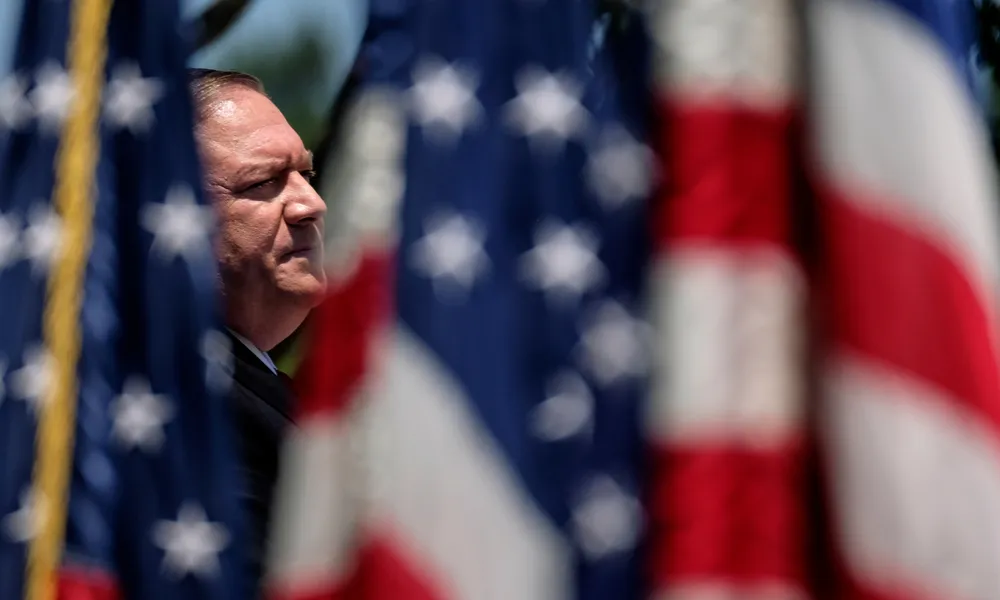At the Economist conference in Nicosia, former US secretary of state and former CIA director Mike Pompeo set out a blunt premise. The central task of US foreign policy was, is and remains managing China as a strategic competitor. Addressing the Cypriot audience, he argued that the United States must align economic, diplomatic and military resources to confront the Chinese Communist Party. He framed current US engagement with regional crises through that lens, suggesting that resolving problems in the Middle East would free up political, diplomatic and military bandwidth for the China challenge.
Beijing, the United States and everyone else
Despite fatigue from multiple crises, Pompeo said pressure should be focused primarily on Beijing, which he described as the core geopolitical test. He called for preparing 65 to 70 percent of global GDP for a potential confrontation, not because the United States seeks it, but because, in his view, Xi Jinping has imposed this contest on the West. Notably, he targeted the party and its leader, rather than China as a nation. The rapid escalation in Gaza and, for many, the controversial interventions by Donald Trump were presented as signalling that Washington still sees itself as the ultimate security guarantor. As Pompeo put it, no one calls Xi when they need protection. They still call the United States.
Energy and the Eastern Mediterranean
In the Eastern Mediterranean, US policy aims to use energy resources and transit options both as leverage and as platforms for resolving disputes. Recent Chevron moves and the prospect of renewed talks on maritime zones are seen as feasible because they align with US goals of diversification and regional stability, opening an opportunity for the Cyprus–Greece axis.
These dynamics create unique openings for two small countries with modest geopolitical weight, argued Alexandros Kostopoulos, president of the U.S.-Greece Trade and Investment Council. He urged a big-picture approach with tangible projects, calling energy a primary factor for the day after and linking growth to security and defence. Now is the time to join forces and build an investment arc, he said, describing Greek-Cypriot cooperation as a strategic choice with international resonance.
The Eastern Mediterranean has become a critical pillar of Europe’s energy security, said New Democracy MP and former Greek deputy foreign minister Tasos Chatzivasileiou. Since Russia’s invasion of Ukraine, the region has gained an upgraded geopolitical profile as Europe seeks alternatives to Russian gas.
This is the most critical period since the Second World War and the Cold War, argued Konstantinos Filis, director of the Institute of Global Affairs and assistant professor at the American College of Greece. Despite difficulties and what he called missteps in Ukraine, he sees room for hope in the Eastern and Central Mediterranean, where states show willingness for consensus. He highlighted Greece, Cyprus, Egypt and Israel as key players, with energy acting as a catalyst for cooperation. Referring to Chevron, he said energy can anchor consensus and that the region could evolve into an important supplier for Europe, especially as the continent seeks to eliminate imports of Russian gas.
Turkey’s role
Where does Turkey fit in? In Cyprus and Greece it is often viewed primarily as an adversary, but many partners see Turkey as a partner. Pompeo’s assessment was nuanced. Turkey is a problematic ally but not an enemy. He recalled efforts to dissuade Ankara, as a NATO member, from acquiring a Russian air defence system. The relationship is complicated, he said, expressing hope that Turkey will become more European over time and that all sides can help achieve that.
The reality in Gaza
Speakers described Gaza as exceptionally complex, balancing internal divisions, regional rivalries and scenarios of external intervention. It is not certain the US plan will deliver peace. Pompeo argued that the joint US–Israel effort to weaken Iran and its proxies preceded the plan and that the real locus of destabilisation remains in Tehran, which undermines peacemaking.
Arab and Israeli narratives diverge sharply. Peace in the Middle East cannot be achieved without a viable Palestinian state, said Amre Moussa, former secretary general of the Arab League and former Egyptian foreign minister, calling for cooperation and respect for the rights of all peoples in the region. Former Egyptian foreign minister Sameh Shoukry said the agreement offers hope but noted the obstacles ahead. He argued the Palestinian Authority has been systematically undermined by the Israeli government and must be reformed to be accepted as the authority that could help administer Gaza the day after.
For Israel, removing Hamas from Gaza remains essential to guarantee citizens’ security and prevent another October 7. The window of opportunity did not open with words but with resolve, said Israel’s ambassador to Cyprus, Oren Anolik. He argued that Israel, acting in defence, dismantled the ring of fire, a terrorism network that held societies hostage in Gaza, Lebanon, Iraq and elsewhere under Iran’s shadow.
